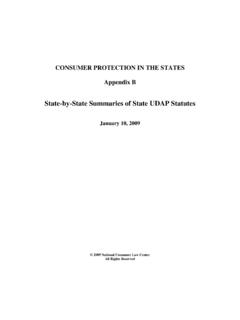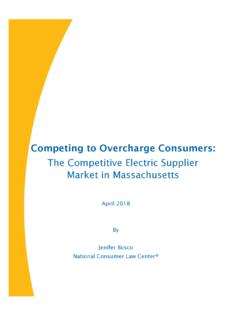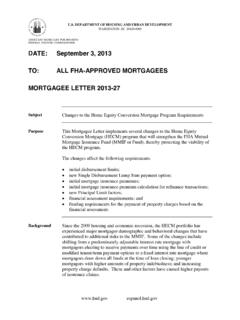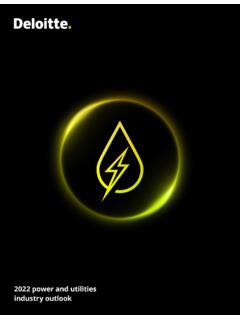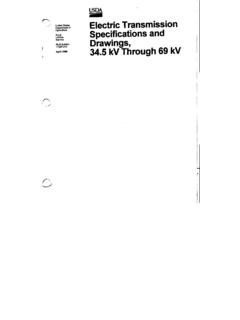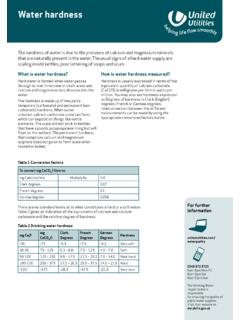Transcription of cf dealing with utility companies - National Consumer Law ...
1 FACTS. N a t i o n a l C o n s u m e r L a w C e n t e r . FOR OLDER CONSUMERS. dealing with utility companies : Disputes, Making Payments Affordable, Bills, Deposits, and Service Shut-Offs The Public utility 's Duty to Serve . Courts and state legislatures have long recognized that access to public utility service is a basic necessity in modern society. Public utilities are those utilities like electricity, natural gas, water and local phone service that serve the general public. Public utilities have a duty to serve. This means that utilities must provide service to any member of the public living within the utility 's service area who has applied for service and is willing to pay for the service and comply with the utility 's rules and regulations.
2 The utility 's duty to serve is not absolute, however. A utility may deny service for good cause ( , nonpayment). Information About Payment Affordability Programs Community Action Agencies, utility companies and state utility commissions may provide consumers with information about the existence of bill payment assistance programs, utility discount rates, weatherization and conservation services, and emergency assistance funds. The LIHEAP Clearinghouse National Energy Assistance Referral (NEAR) project is a free service for those who want information on where to apply for Low Income Home En- ergy Assistance.
3 The toll free number for NEAR is 1-866-674-6327, or TTY 1-866-367-6228. Your state utility commission's Consumer division or your local phone company should be able to provide you with more information about discounted local phone rates (called Lifeline) and discounted phone connection assistance (called Link-Up). Residents living on reservations may qualify for an enhanced Lifeline local phone rate that could be as low as $1 a month. Lastly, some water companies may have budget billing plans or payment as- sistance programs, and you can ask whether they are available and if you are eligible to participate.
4 Billing Disputes In general, utilities are prohibited from disconnecting service if there is a legiti- mate billing dispute. Your rights and responsibilities regarding utility service will vary depending on the state you live in and the type of public utility at issue (municipal utilities and cooperatives generally are not regulated by the state but by gov- erning authorities or boards). For example, there may be a regulation that will prevent the utility from disconnecting your service during a billing dispute, but you may be required to pay the undisputed portions of your bill. Deposit Requirements and Limitations utilities typically can require a deposit or security from their customers as long as the re- quirement is reasonable and not discriminatory.
5 If the utility is regulated by the state pub- lic utility commission, there will likely be specific rules for the amount of the deposit and under what circumstances a deposit can be required. Some state public utility regulations provide alternative measures of creditworthiness in lieu of a deposit. These alternatives include allowing the customer to provide a guarantor who promises to pay the utility bill if the customer fails to pay, a good payment record with the utility , proof of home owner- ship or full-time employment for a set period of time. Some states limit the ability of a utility to require a deposit at certain times of the year (for example during the winter) or as applied to certain low-income or elderly customers.
6 Terminations of Service There are laws and regulations that require a utility to provide its customers with notice before it can terminate service. During this notice period, customers can take the oppor- tunity to correct any misunderstandings or incorrect information by the utility , obtain cri- sis/emergency grants of payment assistance, establish a payment plan for arrearages, or register a complaint with the state public utility commission. States often have some de- gree of protection against terminations, often during the winter months, for certain classes of customers. Protected customers have included the elderly, customers with serious ill- ness or disabilities (that may also include mental incapacity).
7 Contacting Your utility About Your Complaint You should first contact the utility if you have a complaint about billing or quality of ser- vice. If you are not comfortable contacting the utility by yourself, you may want to have an advocate help you. First, gather all of the documents relating to your utility problem (include bills and let- ters to the company or from the company). Keep detailed records of your conversations with the utility (who you spoke to, title, time of call, summary of the call). If the customer service agent cannot help resolve your problem, ask to speak to a super- visor.
8 Finding Out About Your Consumer Protections If you are unable to resolve a billing or service quality dispute with your utility , call your state public utility commission (PUC) or public service commission (PSC) which oversees the rates of and services provided by regulated utilities . Generally speaking, there are utilities regulated by state utility commissions and municipal utilities , and cooperatives that are overseen by local governments or boards (although some state commissions do have limited authority to regulate municipal utilities as well). The commission staff can explain how to file an informal or formal complaint and the commission review process.
9 Your PUC or PSC should have a Consumer division that can help you and your advocate 2. locate the appropriate state laws, regulations, and policies concerning billing disputes, de- posit requirements, payment and affordability plans, and service quality requirements. The utility commissions typically have a mechanism in place for consumers to file informal or formal complaints against their regulated utility , but often have little authority over mu- nicipal utilities or cooperatives. There are also other Consumer laws that may provide addi- tional protections and you may want to seek the assistance of an attorney specializing in Consumer law.
10 Other Contacts You may want to contact your state office of consumers counsel, ratepayers advocate or Consumer advocate. This may be an independent agency, or it may be housed within your state attorney general's office. The state utility Consumer advocate may also be able to lo- cate the laws, regulations, and policies that apply to your particular situation. The Na- tional Association of State utility Consumer Advocates (NASUCA) can help you find the Consumer utility advocate in your state. The number for NASUCA is (301) 589-6313, and its website address is Your local legal services office and senior advocacy groups may also be able to help you with your utility problems.





